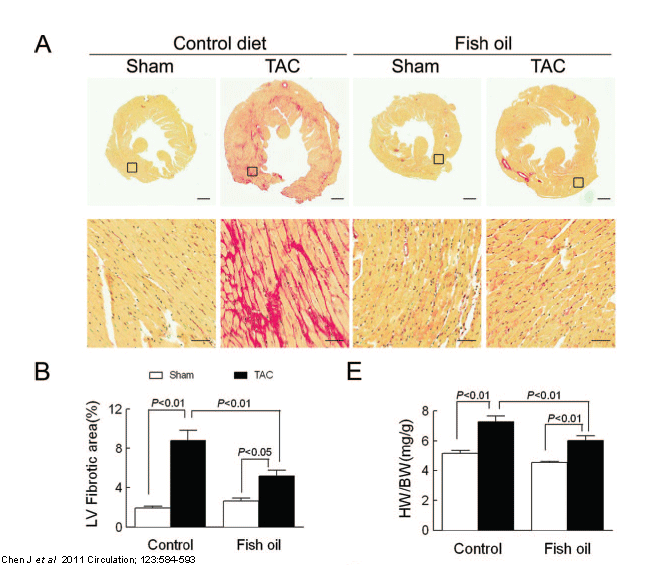The O'Connell Lab
Refuting the Irrefutable Since 2004
Omega-3 Poly-unsaturated Fatty Acids (ω-3 PUFAs) Prevent Fibrosis
Fibrosis is a pathologic accumulation of extracellular matrix (ECM) usually associated with chronic inflammation. Fibrosis is a hallmark of many chronic conditions including cirrhosis of the liver, interstitial lung disease, kidney disease and heart failure. At the molecular level, tissue injury promotes recruitment of immune cells, leading to local release of inflammatory mediators (e.g. TGFβ1, CCL3, and CCL2) and activation of fibroblasts, which leads to increased ECM production, fibroblast proliferation, and fibroblast-to-myofibroblast transformation. Current treatments are mostly aimed at inhibition of inflammatory mediators, but a potentially novel approach that might preserve tissue architecture could be to inhibit fibroblast activation.
Recently, we showed that ω3-PUFAs prevented fibrosis and cardiac dysfunction in a mouse model of hypertensive heart failure via inhibition of collagen expression, fibroblast proliferation, and fibroblast-to-myofibroblast transformation. We also demonstrated a direct effect of ω3-PUFAs to inhibit TGFβ1-mediated fibrosis in cultured fibroblasts. Mechanistically, ω3-PUFAs are thought to regulate ion channels to mediate short-term effects, or to incorporate into membrane phospholipids and thereby alter lipid-rafts. However, FFAR4 was recently identified as a receptor for long-chain FA, like ω3-PUFAs. In this project, we are examining novel hypothesis that the ω3-PUFA eicosapentaenoic acid (EPA) is anti-fibrotic and signals through activation of FFAR4.
Lab Publications Relevant to this Project:
-
O'Connell, TD, Block, RC, Huang, SP, and Shearer, GC. 2016. Omega-3-Polyunsaturated fatty acids for heart failure: effects of dose on efficacy and novel signaling through free fatty acid receptor 4. J Mol Cell Cardiol. PMID: 27986444
-
Eclov, JA, Qian Q, Redetke R, Chen Q, Wu SC, Healy CL, Ortmeier SB, Harmon E, Shearer GC, and O'Connell TD. 2015. EPA, not DHA, prevents fibrosis in pressure overload induced heart failure; potential role of free fatty acid receptor 4. J Lipid Res. PMID: 26435012.
-
Chen J, Shearer G, Chen Q, Healy CL, Beyer AJ, Gerdes AM, Harris WS, O’Connell TD, and Wang D. 2011. ω-3 fatty acids prevent pressure overload-induced cardiac fibrosis through activation of cGMP/PKG signaling in cardiac fibroblasts. Circulation. 123: 584-93.
